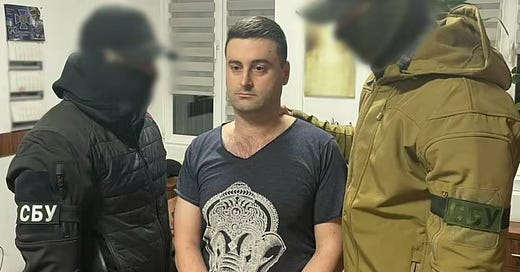Ukraine’s First EU Sting against Russian Propaganda
A fictional fellowship, a fake contact, and a flight to nowhere – inside one of Ukraine’s most brilliant intelligence plays
It looks like Ukraine’s Security Service and Foreign Intelligence Service have just pulled off one of their most brilliant operations to date – targeting and arresting a particularly insidious pro-Russian propagandist.
What we know:
On the 31st of March this year, Russian propaganda channels reported that Polish authorities and arrested Kyrylo (or Kirill, in Russian spelling) Molchanov and deported him to Ukraine. On the 1st of April, Ukraine’s services confirmed the reports:
The Security Service of Ukraine, in cooperation with the Foreign Intelligence Service of Ukraine and law enforcement agencies of the Republic of Poland, has carried out a multi-stage international special operation within the European Union. For the first time since the start of the full-scale invasion, and at the request of the SBU, a Russian agent operating in the information sphere has been handed over to Ukraine.
Initially detained in Poland, the individual is now being held in a pre-trial detention centre in Kyiv.
The suspect is a so-called “political expert” linked to the media circle of Viktor Medvedchuk, who is himself accused of high treason.
According to the investigation, the agent was recruited by and worked simultaneously for two Russian intelligence agencies – the FSB and the Foreign Intelligence Service. Under the occupiers’ instructions, he sought to discredit Ukraine internationally and destabilise the domestic affairs of Ukraine’s partner countries.
In 2022, he relocated to Russia, where he became a key ideologue behind Kremlin media projects such as Other Ukraine and Voice of Europe.
What happened:
While Ukraine’s security services have not disclosed operational details, I have tried to reconstruct the likely sequence of events based on my research.
Molchanov’s involvement with “Other Ukraine” – a joint disinformation venture of the Social Design Agency and Viktor Medvedchuk – and “Voice of Europe” (Medvedchuk’s project too), suggests he was in contact with far-right members of the German Bundestag, particularly those affiliated with Alternative for Germany. (There may also have been links to far-right Austrian politicians—something worth investigating further.)
Given this political context, Ukraine’s services may have baited Molchanov with a seemingly prestigious opportunity, likely crafted to exploit both his ambitions and ego. The letter he received reportedly read:
Dear Kyryl,
We are pleased to inform you that the selection committee has chosen you to participate in the Media-Zukunft Fellowship! Congratulations on this achievement.
We were highly impressed by your application, and we are excited to welcome you to the program. In the coming days, Anastasia Galenkovskaya, our program assistant, will reach out to you with further details and guidance on the next steps.
Should you have any immediate questions, please do not hesitate to reach out. We look forward to seeing you as part of this year's fellowship and working together to shape the future of media.
Best regards,
Michael Schneider, Program manager
[Austrian phone number]
A quick online search reveals that no such programme – “Media-Zukunft Fellowship” – exists. Nor does anyone by the name Anastasia Galenkovskaya. And while “Michael Schneider” is a common enough name, none of the real ones seem to have anything to do with this fictional fellowship.
This leaves us with two possibilities:
The fellowship is a covert programme, and Molchanov genuinely applied (though the word “fellowship” seems out of place in such a context), or
More plausibly, this was an elaborate trap – one he walked straight into.
Assuming the latter, we can only speculate on the details. Perhaps Molchanov was tipped off by a “trusted contact” – a persona created or manipulated by Ukrainian services – who told him he’d be receiving this opportunity. Or maybe he simply believed himself important enough to receive such an offer without applying at all.
(And here’s an ironic twist: had Molchanov accepted a real German or Austrian fellowship, he’d likely be labelled a “foreign agent” in Russia!)
Either way, the correspondence with “Michael Schneider” and “Anastasia Galenkovskaya” eventually led to flight arrangements – supposedly taking him from Moscow to Istanbul, then on to Poland, and finally Berlin.
But the moment Molchanov landed in Poland (the exact airport is still unknown), he was arrested by Polish authorities and, as we now know, handed over to Ukraine.
A brilliantly executed operation – clever, strategic, and hinging on a mix of overconfidence, ego, and carelessness.
Because really – if Molchanov never applied for this non-existent fellowship, why accept it? If the fellowship was German, why did the contact provide an Austrian phone number? If it was Austrian, why was he headed to Berlin? And why fly via Poland when there are direct flights from Istanbul to Berlin?
So many red flags. So many questions.
For now, we can only hope that Ukrainian authorities will one day share more about how this sting was orchestrated. But until then – congratulations to Ukraine’s Security Service and Foreign Intelligence Service on a job masterfully done.
And let’s not forget the Polish agencies whose cooperation was instrumental to Ukraine’s success!




Odd. Your questions raise the likelihood that there is something else going on.
After all, a guy like that, active in media manipulation, would do as you did - which is to Google that institution to find out what it is, would have asked himself too why a German organization would come with an Austrian telephone number, etc. You assume he didn't - why?
It also seems like pretty poor tradecraft on the Ukrainian side not to have created a fake website for that organization.
So we have poor tradecraft and a rookie mistake. Something doesn't smell right.